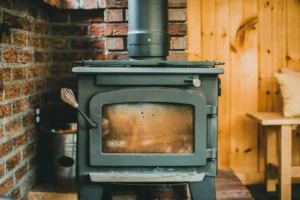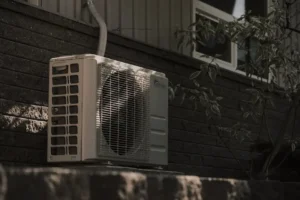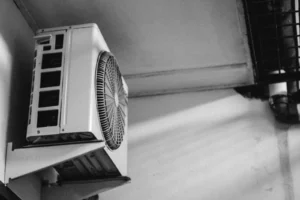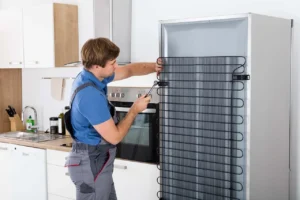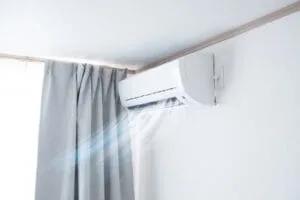Nothing feels better on a hot summer day than walking into a cool home and relaxing with a cold drink.
On the other side, nothing feels worse than walking into a home with the air conditioning running and feeling warm air blasting from the vents, thinking, “why is my central ac running but not blowing air?”
When you have AC running but not cooling, you’re wasting energy and burning up money.
Keep reading to learn about why you may have an AC not cooling your house, and what you can do about an AC not cooling enough.
Is Your Central Air Running But Not Cooling?
Just because your AC is running does not mean it is adequately cooling your house.
However, just because you have a warm house, does not mean your AC isn’t blowing cold air.
Do some simple checks at the start before you call in a repairman.
Check Your Filter
Every month, check your air filter.
Clogged filters will restrict airflow and slow down the function of your air conditioner.
A clogged filter will also prevent your air conditioner from removing excess moisture.
Humid air holds heat.
So if your AC cannot remove moisture, your home will feel warmer.
Also, a clogged filter will tax your HVAC system.
It may even cause your entire system to seize up and freeze.
It will damage one of the more expensive appliances in your home.
Do You Have the Right Air Filter?
You may have a clean filter, but if you have the wrong-sized filter, your AC will not run efficiently.
Filters come in all sizes.
Read the manual for your HVAC system.
You need a filter with the minimum efficiency reporting value, or MERV, that your HVAC system requires.
Make sure you have your filter installed the correct way.
In some systems, you can put your filter in backward.
A backward filter will not capture the dirt, humidity, and other particles you need it to capture.
Your HVAC system will not function properly if you put the filter in backward.
Clean Your Unit
You may just have a filthy unit.
If you have a dirty and clogged condenser, evaporator, or coils, your HVAC system will not work efficiently.
You can break out your air compressor and blow off the system.
You can also attempt to clean the outside with a shop vac, vacuuming up debris and dirt particles.
Or you can call an expert to clean the inside of the HVAC system.
If you cover your AC unit every offseason, make sure you’ve removed the cover.
A covered AC unit will not work efficiently.
Leaky Air Ducts
Air-conditioned air does not move straight from your AC unit into your living room.
It travels through a series of ductwork, sometimes dozens and hundreds of feet, to get to you.
If you have compromised ductwork, then your AC will not adequately cool your home.
Air doesn’t go straight from your AC unit to your home.
Take time to inspect your ductwork.
Look for leaks and moving air.
If you suspect clogged ductwork, call in a professional.
Professionals have found all kinds of treasures in ductwork from small toys to animal carcasses to balls.
When it’s time for you to buy a new air conditioner, have an expert come in to examine your ductwork.
Your lack of cool air might be due to some poorly designed ductwork.
Malfunctioning Thermostat
Take some time to test out your thermostat.
Make sure your thermostat is working properly.
You may have a thermostat that works but is in a poor place.
If your thermostat is in one of the coolest spots in the house, it is going to register the temperature just in that area. As a result, you will have warm rooms in your house but an accurate thermostat.
Blown Breaker
This is a simple problem but one that people often overlook.
Some homes have electrical systems that feed the fans and the air conditioner with two different electrical systems.
So you can blow a breaker for your air conditioner, but your fan will still run.
This means your fan is circulating warm air while your AC does not kick in.
Check your breaker box to make sure you do not need to flip a breaker and get your AC back up and running.
Low Refrigerant
If your HVAC system is running constantly but not blowing cold air, you could easily be low on refrigerant.
All HVAC systems need refrigerant to run properly.
What Does Refrigerant do?
Refrigerant is a chemical that moves around the HVAC system.
The refrigerant enters the system as a vapor.
Your system’s compressor will force the refrigerant around to each of its components the compressor of the system forces the refrigerant around to each of its components at a low temperature and low pressure.
The compressor then pulls in the refrigerant and then compresses it.
It takes the molecules and squeezes them into a smaller volume.
Those molecules then collide more often and convert their energy into heat.
This is why, when you check your AC, the pipes are actually warm and not cold.
The condenser than takes all the unwanted heat and sends it into the atmosphere.
Air moves across the pipes and removes the energy from the refrigerant.
By the time the refrigerant leaves the condenser, it is a completely saturated liquid.
The air is cooler because of this process.
When your system does not have adequate refrigerant, it cannot cool your home.
It will work hard to try to send cold air, but your home temperature will just go up with the outside temperature, no matter how hard the machine works.
You will know you’re low on refrigerant when you AC begins to freeze up.
You can actually do damage or overheat your HVAC if you run it without adequate refrigerant.
Inspect Your System
If you suspect you’re low on refrigerant, take time to go to your furnace room and look carefully at your HVAC machine.
If you notice any ice or frost on the coils or pipes, turn your AC off immediately.
Let the AC thaw out, and call an HVAC expert to refill your refrigerant.
Refilling refrigerant is a simple but costly fix.
If you do not have adequate refrigerant, not only will you have an AC unit not cooling your house, but you could destroy your entire HVAC system.
Improper Installation
If you have a brand new air conditioning unit that is blowing warm air, you’re certainly frustrated.
You have spent a big chunk of change and still have a warm house.
Unfortunately, you may have an improperly installed unit.
Your contractor may have made a mistake or two and not properly installed the unit.
So start by making sure the unit is not leaking anywhere.
If you suspect a properly installed unit, call your contractor and have them reinstall the unit for free.
You may also have a unit that is too small or too big for your home.
If you have done any sort of remodeling, for example, you may need a bigger AC unit to cool your home.
A unit that is too small could cause problems as well.
If Your AC Is Too Big
You will know you have a unit that is too big if you have short cycles.
Your AC unit should run for 20 to 30 minutes at a time.
If it is running just for a few minutes at a time, your AC unit could be too big.
If one room is too warm and another is cool, you could have too big of an AC unit as well.
Also, if you have too humid of a room, you could have too big of a unit.
When your unit runs for the proper amount of time of 20 to 30 minutes, it will suck the humidity out of the room.
If your unit is running for short spells, it does not have the time to suck the humidity out.
Also, if your electricity bills are high, you may have a unit that is too big.
An AC unit takes the most energy to power up and power down.
So if your unit is constantly powering up and down, it is sucking more kilowatts and costing you more money.
Plus, it’s not keeping your house cool enough.
If Your AC Is Too Small
If your AC is too small, it will never stop running.
It will try its hardest to cool your house, but it will not have adequate power to cool the entire structure.
An AC needs at least 12,000 BTUs for each ton of heat that you’re removing.
When you purchase an air conditioner, consider the following factors:
- How big is your home? Make sure the unit is the right size. You should have one ton of AC capacity for every 500 square feet.
- What is your home made of? The construction of your home will determine if it will hold cool air or not.
- How high is your ceiling? If you have high ceilings, you need a bigger unit.
- What is your home insulated with? If you have a well-insulated home, you can get by with a smaller unit.
- How many doors and windows do you have? If you have several points of entry for warm air, then you need a bigger unit.
- How many people live in your home? If you have many people in your home, they will generate more heat, and you will need a bigger unit.
If your AC is too small, you will have high energy bills and your AC will run constantly.
Also, if you have inconsistent heat, where one room is always warm and another is always cold, you could have too small of an AC unit.
Central Air Not Working?
When you have AC running but not cooling your home, tempers can heat up quickly. Stay cool by running some basic checks on your home before you start shopping for new HVAC units. Call a local repairman to service your unit and give you more ideas on how to keep your home and moods cool.
For all of your air conditioning and general HVAC needs, contact us.

